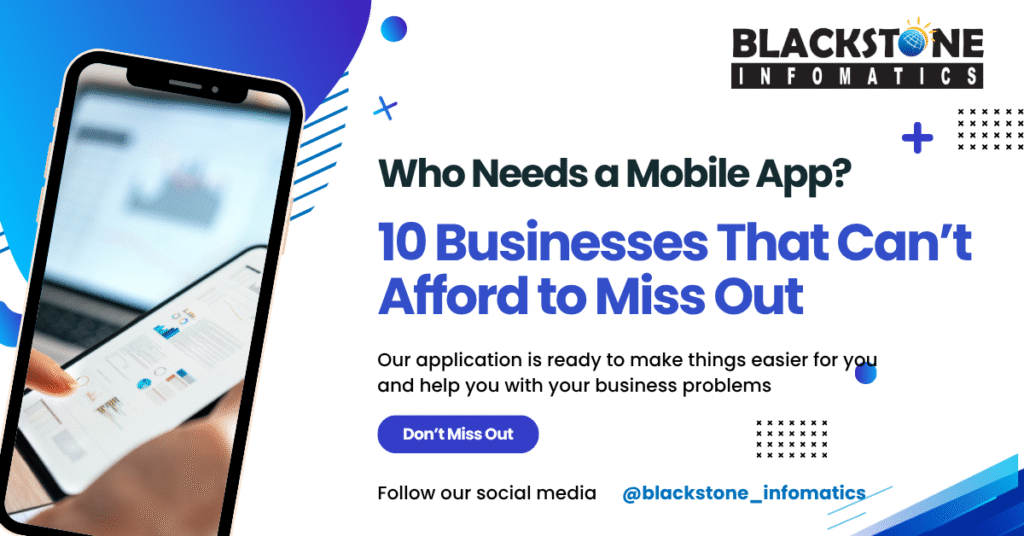
In 2025, smartphones are everywhere, and customers expect businesses to be right at their fingertips—literally. Whether you’re a small startup or an established brand, having a mobile app is no longer a luxury; it’s a necessity. But who really needs a mobile app? Which businesses benefit the most?
In this article, we’ll explore 10 types of businesses that absolutely can’t afford to miss out on mobile apps. Plus, we’ll break down why mobile apps are essential, what benefits they offer, and how they can help your business grow.
Why Do Businesses Need Mobile Apps?
Before diving into the list, let’s answer the big question: Why do businesses need mobile apps?
Here are just a few of the major benefits of having a mobile app for your business:
24/7 accessibility to customers
Improved customer experience and engagement
Direct communication through push notifications
Increased brand loyalty
Higher conversion and sales
Better customer data collection
Apps are not just tools; they are customer touchpoints that create convenience, trust, and interaction.
Top 10 Businesses That Need a Mobile App
Let’s go through the industries and businesses that benefit most from mobile apps, along with real-life use cases.
1. Restaurants & Food Delivery Services
Why they need it:
In today’s fast-paced world, customers love the convenience of ordering food from their phones. A mobile app allows them to browse menus, place orders, make payments, and track deliveries—without calling.
Example features:
Online food ordering
Table reservations
Loyalty rewards
Push notifications for deals
2. E-Commerce and Retail Stores
Why they need it:
Online shopping is no longer limited to websites. With a mobile app, e-commerce businesses can provide a seamless shopping experience with faster load times, easier navigation, and personalized recommendations.
Example features:
Product browsing and filtering
One-click checkout
Push offers and flash sales
Wishlist and cart sync
3. Fitness and Wellness Centers
Why they need it:
People want to book sessions, track progress, and follow routines on the go. A mobile app helps gyms, yoga studios, and personal trainers offer a personalized fitness experience.
Example features:
Online class bookings
Workout plans
Diet tracking
Virtual sessions
4. Educational Institutions & Online Learning Platforms
Why they need it:
Education has gone digital. Schools, coaching centers, and e-learning platforms can use apps to provide better access to students anytime, anywhere.
Example features:
Course materials
Live classes
Online exams
Student progress tracking
5. Healthcare Clinics & Hospitals
Why they need it:
The healthcare sector is rapidly adopting digital solutions. A mobile app for healthcare can let patients book appointments, access reports, and consult doctors online.
Example features:
Appointment scheduling
Virtual consultations
Reminders for medicines or checkups
Health records storage
6. Real Estate Agencies
Why they need it:
Real estate is all about presentation and communication. An app allows property agents to showcase listings with images, virtual tours, and location filters.
Example features:
Property search and filtering
Virtual property tours
Contact forms for agents
Property alerts
7. Travel and Tourism Businesses
Why they need it:
Travelers want everything at their fingertips—flight bookings, hotel reservations, itinerary planning. A travel app helps you deliver all of that in one place.
Example features:
Booking options for flights, hotels, and cabs
Tour packages
Travel guides and itineraries
Language/local help tools
8. Taxi and Transportation Services
Why they need it:
Uber and Ola have changed how we travel. If you own a cab service or transport business, a mobile app is essential to compete and deliver convenience.
Example features:
Live vehicle tracking
Fare calculator
Ride scheduling
Driver ratings and feedback
9. Event Management Companies
Why they need it:
Planning an event requires coordination and communication. A mobile app simplifies guest management, event schedules, and live updates.
Example features:
Event calendar and RSVP
Ticket booking
Notifications and reminders
Real-time event updates
10. Retail & Local Stores
Why they need it:
Even local businesses and shops can boost engagement by creating a custom mobile app that showcases their product catalog, deals, and delivery options.
Example features:
Store locator
Loyalty programs
Mobile payment integration
Product reviews
Signs Your Business Needs a Mobile App
Still unsure if your business really needs one? Here are some clear signs:
You want to improve customer retention
Your audience is mostly mobile users
You offer online services or bookings
You want better customer communication
You want to stand out from competitors
If any of these apply, it’s time to invest in mobile app development.
How to Get Started with a Mobile App for Your Business
Ready to create an app but don’t know where to begin? Here’s a quick guide:
Identify the purpose: What problem will your app solve?
Know your audience: What features do they need?
Choose the right platform: Android, iOS, or both?
Hire a professional app development company: Look for experienced developers in your region (e.g., mobile app development company in Coimbatore).
Focus on UI/UX: Simple, smooth, and beautiful design is key.
Plan for updates: Keep the app fresh with new features and improvements.
Final Thoughts
Mobile apps are no longer just nice to have—they are critical tools that drive growth, efficiency, and customer satisfaction. Whether you run a restaurant, a gym, an online store, or a healthcare clinic, a mobile app can transform how you do business.
Don’t let your competitors move ahead while you stay stuck in the old ways. It’s time to build a mobile app for your business and unlock new opportunities.
